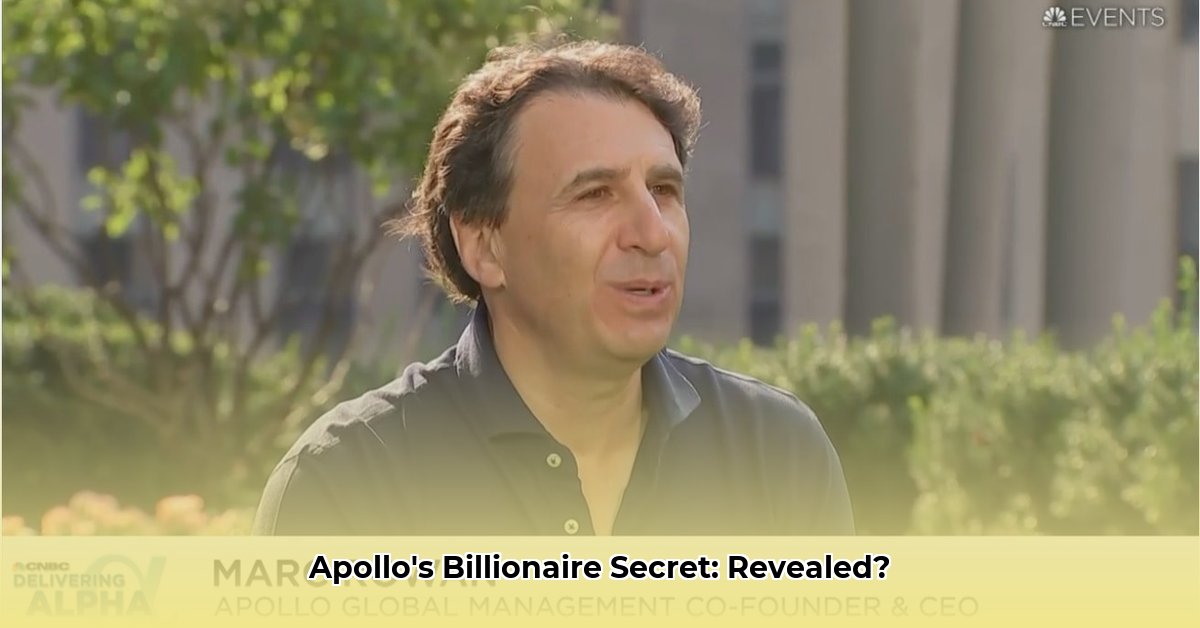
Marc Rowan's Ascent: From Drexel to Apollo's Apex
Marc Rowan's journey to becoming a private equity titan is a compelling narrative of ambition, shrewd investment strategies, and navigating the complexities of high finance. His early career at Drexel Burnham Lambert, a prominent player in the 1980s leveraged buyout boom, provided invaluable experience. While Drexel's eventual bankruptcy serves as a cautionary tale, it also shaped Rowan’s understanding of risk and reward, influencing his future approach to deal-making. This foundational experience proved crucial in his subsequent co-founding of Apollo Global Management.
How did a background at a firm ending in bankruptcy lead to the creation of a financial powerhouse? This strategic pivot and transition to Apollo highlights the ability to learn from failures. Apollo's incredible growth – managing over $650 billion in assets under management (AUM) as of early 2024 – is a direct testament to Rowan’s leadership and strategic vision. His estimated 6% ownership stake directly reflects the firm’s success, making his personal net worth exceptionally substantial. But what specific strategies propelled Apollo to such heights?
Apollo's Financial Engine: Strategies and Returns
Apollo's immense AUM isn't merely a statistic; it signifies a diverse investment portfolio across numerous sectors. The firm’s success stems from sophisticated financial strategies, including complex acquisitions, debt restructurings, and strategic investments. These approaches consistently generate substantial returns, a significant portion of which is distributed to managing partners, including Marc Rowan.
While the exact figures remain confidential – a standard practice within the private equity industry – the scale of Apollo's profits undoubtedly contributes significantly to Rowan's personal wealth. The lack of complete public transparency makes precise net worth calculation challenging. Is there a way to gain a clearer picture of Rowan's financial standing beyond these opaque transactions? Understanding the broader financial dynamics of Apollo provides some clues. The sheer magnitude of Apollo's dealings strongly suggests a substantial net worth for Rowan.
Navigating Controversy: Reputation and Ethical Considerations
Apollo's trajectory, while marked by remarkable financial achievements, includes periods of controversy. The firm's past association with Jeffrey Epstein, particularly Leon Black’s involvement, significantly impacted Apollo’s reputation, raising ethical concerns and impacting investor confidence. Although Marc Rowan wasn't directly implicated, this controversy inevitably affected the firm’s image, potentially impacting its overall valuation and indirectly influencing his net worth.
How did this controversy shape Apollo's subsequent strategies? The long-term impact of reputational damage on a firm's value is substantial. To maintain its leading position, Apollo must prioritize ethical standards, transparency, and robust risk management. This is crucial not only for investor confidence but also for safeguarding the company’s value and the wealth of its partners. Will this heightened scrutiny affect future growth?
Diversification and the Future: Risk Management and Opportunities
Marc Rowan's financial ventures extend beyond Apollo. His personal investment firm, RWN Management, further diversifies his portfolio. Specific details about RWN Management's strategies are largely undisclosed, making it difficult to quantify its contribution to his overall wealth but adding another layer of complexity to understanding his net worth. This diversification highlights a proactive approach to risk management, common among high-net-worth individuals. How does this diversification strategy influence the risk profile of Rowan's overall empire?
Apollo's future, and consequently Rowan's net worth, hinges on its ability to navigate several critical factors. The ongoing increase in regulatory scrutiny necessitates robust compliance measures. Intense competition within the private equity industry requires continuous innovation and strategic adaptation. Maintaining a positive reputation remains paramount for attracting and maintaining investor confidence. These factors will all contribute to the firm’s future performance, directly impacting its valuation and, subsequently, Rowan’s wealth.
Analyzing Key Risks and Mitigation Strategies at Apollo
The following table summarizes key risks facing Apollo and the mitigation strategies employed:
| Risk Category | Likelihood | Impact | Mitigation Strategy |
|---|---|---|---|
| Increased Regulatory Scrutiny | High | High | Strict compliance, transparent governance, proactive engagement with regulators. |
| Reputational Risks | Medium | High | Enhanced transparency, ethical guidelines, community engagement projects. |
| Market Volatility | High | High | Diversified investment portfolio, sophisticated risk models. |
| Competitive Pressure | High | Medium | Innovation, strategic acquisitions, talent acquisition and retention. |
This analysis reveals the intricate interplay between financial success and risk management within the private equity world. The challenges faced by Apollo highlight the complexities inherent in estimating Rowan’s exact net worth. Further research and greater transparency could help clarify this picture.
[1] https://www.ft.com/content/7f43b824-aa07-11e9-b6ee-3cdf3174eb89 (Accessed: 2025-02-19)